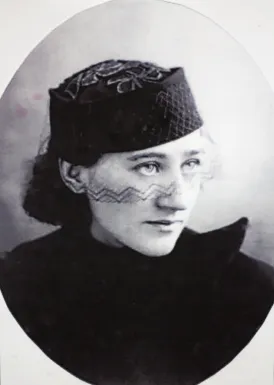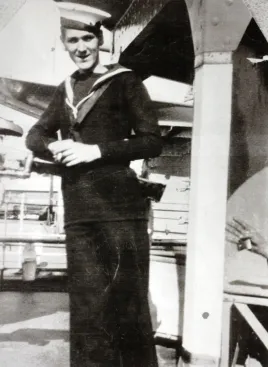![]()
Winter of 1936
THE WHITNEYS WERE A happy loving family from the Aigburth and Dingle area of Liverpool. There were two boys and three girls in the family. Tom was the eldest, then came Eileen, then Lucy (my Mum), then Agnes whom we all called Nell, and Jack, the baby.
My Aunt Gladys and Uncle Tom lived in the Dingle section of Liverpool, which is known as Liverpool-8.
Most streets consisted of terraced houses, some with a little front garden, most had two or three bedrooms. Some featured inside toilets, a typical middle class part of the city. Gladys' house on Woodruff Street was a small three-up two-down house with no inside bathroom. Most middle class houses did not have inside bathrooms until after World War Two. It was a nicely kept street with spotless front steps. Back then, everyone scrubbed their front steps each morning.
The windows on the street were spotless. People took great pride in cleaning them every week. Window cleaners came around, and most people had them do the outside. These were very reasonable with the cost. The mums did the insides of the windows. Everyone hung out the washing on clotheslines, then finished drying it on the maiden in front of the fire.
Some houses had damp spots in the walls. None had central heating back then, but overall the houses on Woodruff Street were classic middle class homes, nice and comfortable.
The Whitneys were a close-knit family, even though Tom was sent away for most of the war. Prior to that, he served in the Merchant Navy.
My Aunty Gladys showed great strength in the years leading up to the war, caring for her family and friends. With her husband Tom Whitney away at sea, she faced crises at home against pneumonia and diphtheria, an epidemic sweeping across the country. It was known as the Plague Among Children.
Gladys would hug her two-year-old, Tommy, a little bit tighter each night.
When Tom Whitney returned home on leave, they would go to the local pub and join the rest of the family in singalongs.
Gladys had three sisters who gladly watched little Tommy for her. Her sister Lily had volunteered that night to watch the toddler. Gladys, meanwhile, was almost due with her second baby.
As Tom and Gladys strolled back home after a singing session at the Albert on Lark lane in Aigburth, she began to feel sharp stabbing pains down her spine.
“Tom, I think I may be starting off a bit early,” she announced, pausing to catch her breath.
“Oh shite!” he said. “Let's get you home then.”
As they arrived at their house, her pains came on stronger and closer together. Gladys' matinee coats and booties were laid out, ready for the baby's arrival.
Gladys Whitney | credit: Peter Whitney
––––––––
TOM SAT HER CAREFULLY onto the couch. “I’ll go tell Mrs. Brown!”
Mrs. Brown placed her medical bag on the table alongside her knitting, which she took to each delivery to pass the time. She examined Gladys, while Gladys' sister Lily stayed on to see if she could be of help.
“Well, love,” said Mrs. B., timing the contractions. “It won’t be a very long night.” A plump little Irish lady, she loved delivering new lives into the world. Mrs. Brown sat quietly by the bed, knitting an Aran jacket for her granddaughter.
Gladys' new baby arrived about three hours after they had returned from the pub, giving Mrs. Brown plenty of time to finish a sleeve on the lovely jacket she was knitting.
Tom paced the kitchen, puffing a cigarette and listening to the wireless. At one in the morning, the baby arrived and screeched his little head off.
Mrs. Brown caught Tom to announce, “Oh another lovely little lad yer got here, just gorgeous.”
She weighed him, cut the cord, and placed him onto the scale. “A good weight too, eight-pounds four-ounces. What you gonna call him?”
“Peter,” Tom replied.
Tom Whitney | credit: Peter Whitney
––––––––
“YEAH. PETER,” SAID Gladys, her exhausted face shining with happiness. “Ooh God, he's just perfect. Look at those little hands, Tom.” She cried with joy.
Lily left early the next morning to tell the family of the arrival of Peter.
Peter came on a treat, and in no time he was crawling around the house. At nine months he was walking. He and his brother Tommy became the little men of the house.
Tom had recently joined the Merchant Navy and was away for several months.
Gladys received a letter saying Tom would be coming home on leave, and she was so excited. It had been difficult alone with her two little lads to care for. Gladys rushed to the butcher to buy meat to cook Scouse, Tom’s favourite meal. She could almost taste the stew, made with mutton, potatoes, carrots and onions, a cheap but satisfying dish. She always cooked Scouse for special occasions. They all loved it, and often dunked in buttered bread. Her heart leapt at the thought of her husband coming home on leave and his face when she placed the steaming dish in front of him to inhale, back with home comforts.
Wrapping her threadbare coat around tightly, she tried to keep warm in the biting winds.
Inside the butcher’s Gladys met up with Mrs. Seddon, her neighbour from up the street. They had lived near each other for years, sharing the holidays and kids' birthday parties.
Mrs. Seddon was two years older than Gladys, with platinum blonde hair, always done up lovely on top of her head in curls. She was a pretty lady and talked quickly, but always sweet to everyone.
“How’s your little Tommy doing, Glad?”
“Smashing. He's talking up a storm and knows all our names, and shouts Dada all the time. Don't yer, lad?” Gladys rubbed the top of Tommy's head.
Mrs. Seddon asked, “Does Peter sleep good for ya, love?”
“Oh yeah. He's a proper good little lad.”
The butcher wrapped Gladys a chuck steak. Steak was an expensive cut of meat, but it was for Tom's arrival back home.
“No worries with 'im,” said Gladys.
They were both avoiding the subject that was on every mums' mind these days.
Gladys said, “Did you hear about Mary Brown from Denton Street? Her little lad died on Tuesday from diphtheria. He was only sick a few weeks.”
“It’s awful how many this is taking,” said Mrs Seddon. “That's the third one I’ve heard of this week.”
“Terrible.”
They shook their heads and looked down into Peter's pram, as he gurgled happily.
Gladys headed off toward the greengrocer's. Along the way, she saw Frances Roberts stepping off the tram in front of Sturla's department store. Tears ran from her dark brown eyes, her face pale against the dark curls. The two ladies had been friends for years with many dances and trips to Blackpool behind them.
Frances caught sight of Gladys and shouted as she ran towards her, “My little lad, Gladys, my little lad!”
“Dear God,” said Gladys, embracing Frances, who was soaked through. “I'm so sorry, love.”
They sobbed and held onto each other.
“Come home with me for a cup of tea.”
Frances slumped against Gladys. She’d spent two sleepless nights in Smithdown Road Hospital.
They rushed back home in the deluge, Gladys pushing the pram through the storm. Her tattered old coat sopped up a cloud's worth. Lifting little Tommy from his seat on Peters pram, his head felt warm. To calm her fears, she rubbed his hair and dried him off, then dressed him in dry clothes.
Frances dropped quietly into the easy chair as Gladys lit the fire. They removed their wet coats and shoes and shivered in the drafty house.
Gladys heated the kettle on the stove and they had a good long talk about what Fran should do next. Fran had to arrange a coffin for her little lad, then sort out the funeral costs.
Gladys advised her to see the funeral director on Park Road. He was known to arrange for people to pay the costs back over time. Frances hadn't seen her other boy, Brian, in two days. She had slept in the chair of the hospital room. Now her neck and back were killing her, from sleeping in that uncomfortable chair.
Gladys comforted Frances. “You are strong, love, remember.” Gladys kissed Frances goodbye.
Neighbours on Briarwood Road had taken care of little Brian while Fran was at the hospital with her sick boy.
Gladys shut the door, and it seemed like everyone knew of a baby dying from one of those dreaded sicknesses. Little Tommy remained asleep, his forehead warmer than expected. Gladys tried not to fret and turned on the radio to distract herself, checking her son’s temperature occasionally.
There was more talk of war in Europe. The BBC reported on the unrest. Jesus I hope we don't get dragged into it, she thought.
A sudden knock at the front door revealed Lucy and Nellie, her two Sisters-In-Law. They often visited for lunch or just a cup of tea when the kids went to bed.
“I’m worried about little Tommy,” Gladys confided in them.
The pair advised her to phone Doctor Roberts from a neighbour’s house. She made the call, and the doctor agreed to come out the next morning.
In the time before the NHS, doctors often took on poor patients free of charge.
With help from her Sisters-In-Law, Aunty Gladys prepared a bath for two-year-old Tommy. Lucy fed little Peter. Nell cleared out old ashes and lit a new fire.
Tommy's cough sounded chesty as she lifted him. Rubbing Vicks on his chest seemed to help a bit. Home remedies often included Vicks.
The next morning, little Tommy seemed to have perked up. Gladys put Vicks in boiling water and a towel over his head for a few minutes. His breathing started to improve.
A familiar voice called in, “Anybody home here?”
Gladys dropped her spoon, as she had just started the Scouse, and she ran to her husband.
Tom stood in the doorway, looking stunning in his navy uniform.
“Oh love, I'm so glad to see you!” As she hugged him, the tension of little Tommy’s illness seemed to seep out of her bones.
Tom lifted her and planted a big kiss on her lips. “Where’s me little lads?”
Little Tommy was asleep in his pram by the fire. In all the...












